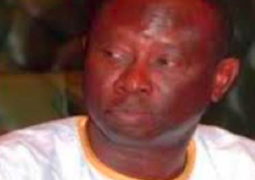A twenty-two member observer mission of the African Union has arrived in
The African Union announced Monday that this was in response to an invitation by the Independent Electoral Commission (IEC).
In a statement issued, the continental body, which also observed last year’s presidential elections, said the observer mission is led by Dr. Samuel Azu’u Fonkam, President, Elections Cameroon (ELECAM).
Six out of seven opposition parties are boycotting the parliamentary polls, after declaring in a statement recently that they were “pushed not to participate in the National Assembly elections” slated for Thursday 29th March.
In a joint statement signed by the leaders of the opposition parties namely, UDP, PDOIS, NADD, PPP, GMC and GPDP, they said since the Independent Electoral Commission has made it categorically clear that it will not postpone the polls, to accommodate “our genuine concerns and win the confidence of our supporters we, therefore, are pushed not to participate in the National Assembly elections.”
With the boycott, the opposition now loses key seats in the Wuli West, Sami, Kiang West and Jarra Central constituencies, which were all held by them.
Elections will take place in 23 constituencies against 17 independent candidates and eight from the opposition National Reconciliation Party (NRP), which broke ranks with the rest of the opposition to contest the polls.
The African Union said its mission is composed of twenty-two (22) members drawn from elections management bodies, national parliaments, the Pan African Parliament, African ambassadors cccredited to the African Union in
The mission observers, the AU added, are drawn from
The mission is assisted by a team of technical staff from the African Union Commission, the secretariat of the Pan African Parliament and the Electoral Institute for Sustainable Democracy in Africa (EISA) based in
“The purpose of the mission is to make the objective, independent and impartial observation of the National Assembly elections,” the AU said.
Guided by the
Determine whether the National Assembly elections are conducted in accordance with the country’s constitution, electoral laws, other appropriate laws and the guidelines governing the conduct of elections; and determine whether the election environment is conducive for voters to participate and exercise their fundamental rights.
It will also establish whether the participating political parties, agencies and groups are satisfied with the preparations for and conduct of elections; evaluate the level of voters’ awareness and whether the voters’ right to choose freely and in secrecy are guaranteed, upheld and protected; and identify and record electoral malpractices, if any;
The AU observer mission is also expected to assess whether the media coverage and conduct are in conformity with the laid down rules and guidelines; evaluate transparency and adequacy of the voting, counting and collation processes; as well as the announcement of the results; and establish whether the results of the elections are a true reflection of the democratically expressed will of the Gambians.
The AU said members of its mission will be deployed throughout The Gambia ahead of the voting day in order to assess the manner in which the people of The Gambia are participating in the current electoral processes, and the environment in which they will exercise their democratic rights.
It said the full report of the AU observer mission on the 2012 National Assembly elections will be presented to the authorities of the Government of the
In its assessment of the November 2011 presidential elections, the African Union said President Yahya Jammeh benefited from a strong media bias and greater financial resources than his rivals to secure a new five-year term in elections.
“Although provision was made for equal access of all political parties and candidates to the public media, the actual coverage was strongly weighted in favour of the candidate of the ruling party,” the AU observer mission concluded.
“The gross imbalance in the financial and material capability of the candidates may have resulted in the lack of adequate visibility of the United Democratic Party (UDP) and the Independent candidates,” it said of his main challengers.
However, the continental grouping found that there were no acts of intimidation during voting and concluded that despite the failings, “the results are a true reflection of the will of the sovereign people of The Gambia”.
The AU observer mission arrived in The Gambia on the 22nd of March 2012, and will remain in the country until the 4th of April 2012.



